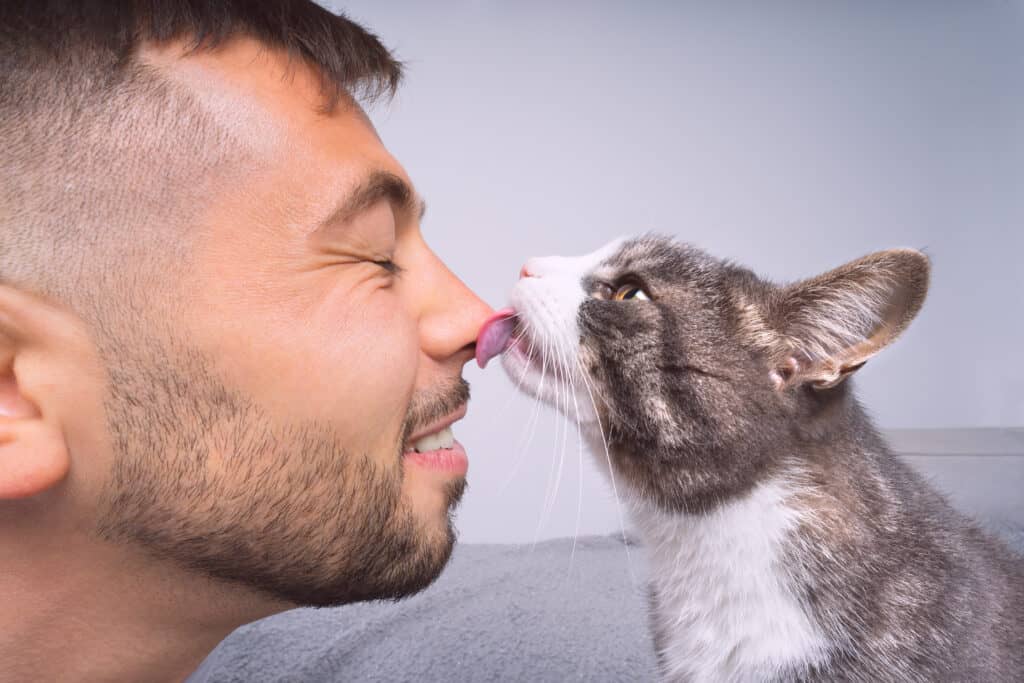When you’re feeling under the weather, it’s important to take care of yourself, as well as the people around you. You might wear a mask, wash your hands frequently, or even isolate yourself to prevent spreading your illness to others. But should you also socially isolate from your cat? Depending on your diagnosis, that might not be a bad idea. Not only can some human illnesses pass to cats, but some cat illnesses can pass to people. This can be especially serious when you or someone you love is immunocompromised or pregnant. If you want to know more about which illnesses can pass between cats and people, we’ve got you covered. This article details the most common problematic illnesses and how you can prevent them from spreading.
Common Ways Illness Passes Between Cats and People

Do cats and people make each other sick?
©iStock.com/Daria Kulkova
Some of the most common ways various illnesses can pass between humans and cats are through body fluids, aerosols, or waste products. Cleaning up cat feces, urine, vomit, or hairballs can put you at risk if you don’t wash your hands thoroughly. Likewise, when you are sick, don’t leave used tissues lying around or allow your cat to lick used plates and utensils. Additionally, don’t allow your kitty to drink from the toilet. Coughing and sneezing are major transmitters of disease, so cover your mouth and wash your hands. Avoid putting your face close to your cat if either of you has symptoms. Kisses and nose boops might need to wait for healthier days.
Illnesses That Pass Between Cats and People

It’s fairly rare for diseases to pass between cats and people, but it can happen.
©KomootP/Shutterstock.com
It’s rare that cats get sick from people, but it does happen. Cats can contract bacterial, viral, parasitic, or fungal diseases from people. They can, on occasion, contract a cold or the flu from people. There are documented cases of a cat getting the H1N1 virus (swine flu) or COVID-19 from humans. However, there is no evidence that animals spread COVID to people. People can also give cats ringworm, salmonella, or giardia. And they can get sick from secondhand smoke!
Cat illnesses that cause nausea and diarrhea can be transmitted to people. These include campylobacteriosis, cryptosporidiosis, salmonellosis, and giardiasis. People can also contract parasites from cats, such as tapeworms, hookworms, ringworm, or roundworms, as well as ticks and tick-borne diseases. Some of the most serious illnesses people can get from cats are MRSA infections, rabies, or even bubonic plague (in the western United States). And finally, cat scratch fever is a real thing. It’s a bacterial infection that you can catch if an infected cat scratches or licks you. It causes a mild infection, swelling, and sometimes fever.
A Special Concern For Pregnant Women

Pregnant women must take extra precautions around cats to avoid contracting toxoplasmosis.
©Ground Picture/Shutterstock.com
Toxoplasmosis is a disease cats can contract by eating small wild animals. The bacteria are present in their feces for several weeks after infection. People might contract it by gardening in soil a cat has defecated in or by changing a litterbox and unintentionally touching their face while the bacteria is on their hand.
Toxoplasma can be passed on to a baby in the womb. It causes some infants to be born with serious eye or brain damage. Some children have been born normally but go on to become blind or mentally disabled later in life.
With these risks, if you don’t have a cat, wait until after your baby is born to get one to avoid the possibility of cat illnesses like toxoplasmosis. If you do have a cat, follow these precautions:
- Have someone else change the litterbox or wear disposable gloves and wash your hands thoroughly.
- Make sure the litter is changed daily.
- Wear gloves when gardening.
- Feed your cat dry or canned food, not raw or undercooked meats.
- Use a meat thermometer when cooking to make sure the interior gets hot enough to kill bacteria.
- Do not drink unpasteurized goat’s milk.
- Do not eat raw or undercooked seafood.
Preventing Cat Illnesses

A healthy diet, exercise, and necessary vaccinations will help keep you and your cat from getting sick.
©Africa Studio/Shutterstock.com
Keeping a clean and sanitary environment is an all-year practice, not just for when you or your animal are sick. This includes wiping down surfaces with disinfectant, immediately disposing of food waste, taking care of dirty dishes, and throwing away used tissues.
Both you and your cat should keep a healthy diet and exercise routine. Feed your friend a healthy, good-quality cat food, and avoid giving human food treats. Keep your cat moving with stimulating toys, videos, and playful interaction.
Vaccinations are important for both you and your cat to prevent illness. Cats need a rabies vaccination every year, as well as a distemper shot that protects against feline viral rhinotracheitis, calicivirus, and panleukopenia. The distemper injection also often includes a Chlamydophila Felis vaccine.
These precautions won’t prevent every illness, but they make sickness less likely and give you and your kitty friend a healthier, more active lifestyle all year long.
The photo featured at the top of this post is © Evgeniya Yantseva/Shutterstock.com
Thank you for reading! Have some feedback for us? Contact the AZ Animals editorial team.







